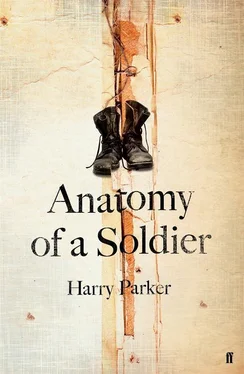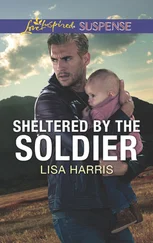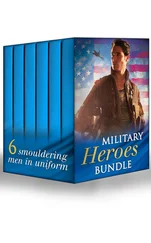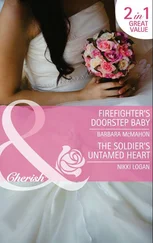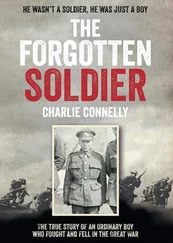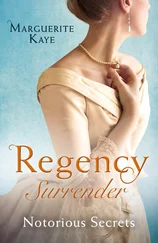She pleaded with him again but he said her husband should be here soon and would help her. He held my handles at the end of straight arms and walked me across the field. At the edge my tyre dropped into a hollow and was stuck and he couldn’t push me forward. He rocked me back and forth, the body jolting inside me, until I finally bounced through it. He leant forward as he heaved me up the bank and onto the flat road.
The corpse’s eyes had opened from the jolting and looked up at him. He looked down into them, at his son’s face and the blue lips and purple blotching across his cheeks and he knew he had already accepted the loss. He lowered my handles and smoothed the eyelids shut again.
He pushed me down the road. The rising sun grew out of the horizon, bathing his face in orange. He was staring at the body in me, in front of him and his knees that brushed its hair with each step. His son was lifeless and inert now — was gone, was dead.
Death was familiar and simple for him. He had lost children and a wife before, but somehow this seemed more unjust. He felt the loss as a missing part of himself, wrenched from him. His arms ached from the weight of me. His son had become a man and was heavy, no longer a boy, but he’d hardly noticed the change and now he was gone. He kept walking and ignored the pain growing in his shoulders.
He wheeled me over a bridge. To his right down a short slope stood the deserted buildings ruined by the fighting. He knew the names of all the families who’d abandoned them, who’d come to him to ask what they should do about the fighting and explosions. He had no answer but continued to support the foreigners and told the families they must too. Up on the hill to his left and dark in the low sun was the cemetery; he didn’t want to look at it yet.
He plodded on. He knew there might be bombs under the road, that my wheel might trigger one and he would be sent after his son, but he didn’t care. Maybe it would be for the best. He knew it was his fault. He’d made his people support them. He’d let the foreigners into his house — given them tea — and now look what they’d done. No tears came but the anger seared through him.
Why had he sent his son to work near their base? His own pride, he thought, and his promise to the families who’d lived here that they could move back soon. And his arrogance, of course, that his people were bigger than this war and all the foreigners. He’d thought his son should share that belief, but he’d sent him to his death.
He looked down between my handles and the lolling head, at the ground passing beneath his sandals. Send me after him, he pleaded, explode around me and bear me away. But the packed mud was flat and hard and he walked on until he saw their base, its high perimeter wall a flat diamond in the landscape with aerials and a flag at its centre. The watchtowers were dark, thin eyes at each corner draped in camouflage nets.
He pushed on and I vibrated over the surface, the body trembling in my tray. The watchtower rose above us as we approached and he glanced up at the dark slit and knew a weapon would have pointed at him since he’d come into sight. He thought how different this was from the last time he’d been here, when they’d invited him in as an honoured guest and served him their disgusting foreign tea.
A voice called to him from the watchtower and he bent down to lower me onto my legs. He stared back up at the black slit and then the heavily accented voice said again that he should come no closer. He waited and gazed at his son. The first mirages of the day puddled on the road and he looked along the wall of their camp to the entrance. An unarmed figure walked out. It was one of their interpreters. A soldier appeared next to him.
They made him open his shirt. He lifted it up and anger flared through him at the lack of trust, the lack of respect, and suddenly his eyes weren’t dry any more. But he controlled himself and explained with as much dignity as he could that one of their bombs had killed his son. His voice nearly faltered but he didn’t want them to see any weakness. Instead, he pointed at the body in me and said it was his son, Faridun.
They made him leave me in the middle of the road with the body. He walked away towards them and they took him into the camp. Before he disappeared he pointed back at me but they ushered him through the gate.
I waited, holding the body of his son that had stiffened below the watchtower as flies weaved above me and then landed on its face.
I was printed and strapped to ninety-nine identical others in a bundle of a thousand. My bundle was one of four in the brick that was shrinkwrapped with many more onto a wooden pallet. Together, we were worth millions. On one side of me is printed the image of a man; he died in 1845. On the other a Palladian building with white columns and a country’s name in a scroll above.
The pallet was forklifted onto an aircraft and I was flown to another place and unloaded. The plastic film was pulled away and all the bundles were removed and sent across a country where there were no Palladian buildings.
I was placed in a brown envelope and delivered to a small room in an isolated patrol base, where BA5799 unwrapped me and put me on a shelf next to a notebook labelled Claims Record .
*
BA5799 entered the room now, yawning, his greasy hair sticking up. ‘Hi, Dan,’ he said to one of the men sitting at the table.
‘Hey, Tom.’
They were on a bench in front of stacked radios and headsets, an open logbook and empty mugs ringed with caffeine stains.
‘Get much sleep?’ the man said as he stood from the bench and pushed a headset away.
‘A few hours.’ BA5799 placed a book on the table. ‘Anything happening?’
‘Not much. We changed the encryption on the radios at midnight and they all seem to be working. It’s been quiet at both checkpoints. The first patrol’s due out at six from Mark’s lot. Just a quick area defensive.’
‘Great, thanks. And when are you back?’
‘I’m due back on at eight.’
‘See you then, sleep well,’ BA5799 said.
They swapped positions in the room and BA5799 sat on the bench, looked at the log and entered his name and the time.
‘Morning, Signaller Williams,’ he said to the man sitting next to him.
‘Morning, sir,’ the signaller said. ‘It’s dead. Nothing doing.’
‘What time did you get on?’
‘Just after midnight. It was a bit of a nightmare changing the radios but it’s all done now. Do you want a brew?’
‘I’ll make it,’ BA5799 said.
‘No need, I want a stretch. I’m getting the two-hour itch.’ The signaller stood and took a couple of tea bags from a tin on the shelf I was on and left the room.
BA5799 opened a book and started to read.
‘What have you got there?’ the signaller said when he came back. He placed the mug in front of BA5799.
‘Just some crap I found in my room. The last lot must’ve left it.’
‘Looks pretty highbrow to me, sir.’
He put the book down and picked up the mug and studied the map in front of them with the flags pinned to it and callsign stickers lined up along one side. He located the building they had destroyed yesterday evening.
He looked over at the signaller. ‘What are you up to?’
‘I was writing home,’ he said, pushing a blue envelope out of the way. ‘But I don’t know what to say, so I’m drawing a tattoo.’ He slid a piece of paper over the desk.
‘Hey, that’s cool,’ BA5799 said.
‘If you think it’s cool, boss, I might have to start again.’
‘Probably not a good sign. Where would you have it?’
‘On my back, I think. But I’ll have to clear it with the missus. They’re expensive but I’ve got a mate in my town.’
Читать дальше
